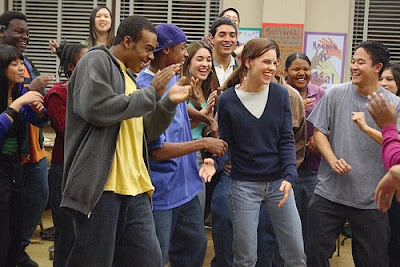I am a movie-buff and I particularly like movies that are based on true stories. They reaffirm my faith in real life happy endings :)
One movie from that genre that is really close to my heart is "
Freedom Writers".
 |
| A shot from the movie starring Hilary Swank - enjoying with her students |
It's an amazing story of a first-time teacher,
Erin Gruwell, who through her unconventional methods of teaching, manages to inspire and teach a class of rebels.
Gruwell has been well played by veteran actress,
Hilary Swank. A fiery, determined character who turns into a rebel to fight the uncooperative school system and help a freshman English class come to terms with itself and the world around it.
Most of the students in her class face violence and racial wars everyday and consider survival, a big achievement. Education doesn't matter to them and they think they don't matter to anybody. But Gruwell tries to understand their pain and change all that.
On the lines of
Anne Frank's Diary, the first book her students were ever able to relate to, she gets them to write their own journals. The journals are later published as a book called "
The Freedom Writers Diary".
Apart from Swank, there are not many known actors (except
Patrick Dempsey and
Scott Glenn, who have rather minor roles) in the movie. Yet, there are some great performances by the cast. And good direction and bits of humor sprinkled through out the film, makes for a great watch.
It may seem like another makeover story of a-bunch-of-rebels-meet-fairy-Godmother-who-changes-them for-life-as-they-come-out-winners-in-the-end. But it isn't all that hunky-dory. For fairy Godmother is very much human who has to make sacrifices and work a lot, to first make her rebels accept her as their teacher and then to make them see the positive side of life.
But the bigger reason the movie leaves an impact on you is because Erin managed to do all that in real life. All her students (who are now referred to as the Freedom Writers) are graduates.
 |
| Erin Gruwell in the pink top in the front row, with her students |
They, along with her, founded the
Freedom Writers Foundation that educates others about innovative techniques of teaching to repeat the success of Room 203 (their classroom). So it really is a fairy-tale ending ;)
Now, if you haven't already left to watch the movie, I highly recommend that you do. It's a must watch!
Bonus read (don't read if you plan to watch the movie):
A few lines from the movie that stood out for me -
- Ms G, on why she chose to become a teacher, instead of a lawyer : "By the time you are defending a kid in the courtroom, the battle's already lost. I think the real fighting should happen here in the classroom."
- On her being a first-time teacher, Gruwell says : "I know I have a lot to learn as a teacher, but I am a really good student."
- One of her students on parole describes her school: "Schools are like the city, the city is like a prison, all of them divided into separate sections, depending on tribes. There's little Cambodia. The Ghetto. Wonder Bread Land. And us, South of the Border or Little Tijuana."
- Ms G, when a student says they seek respect by dying for their race: "To get respect, you have to give it."
And few of my favorite scenes -
- Ms G: "Raise your hands if you know what the holocaust is." No one in the class raises his/her hand, except the only white boy. "Raise your hand if anyone in this classroom has ever been shot at." Everyone raises his/her hand, except the white boy.
- Ms G: "Stand on the line if you have lost a friend in gang violence." Everyone in the classroom is standing on the line facing each other. And that's when they realize they are doing that to each other.
- There is a moment when no parent of Ms G's students turns up for the parents night. Erin is very disappointed after putting in so much effort in her classes. But then, she gets reminded of the journals she'd asked her students to write and keep in the class cupboard if they wanted her to read them. To her pleasant surprise, when she opens the cabinet, ALL the journals are sitting right there. And her smile comes back :)
- The climax...that I don't plan to divulge ;)




